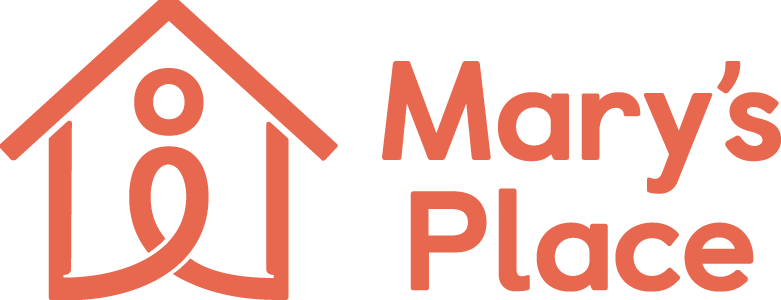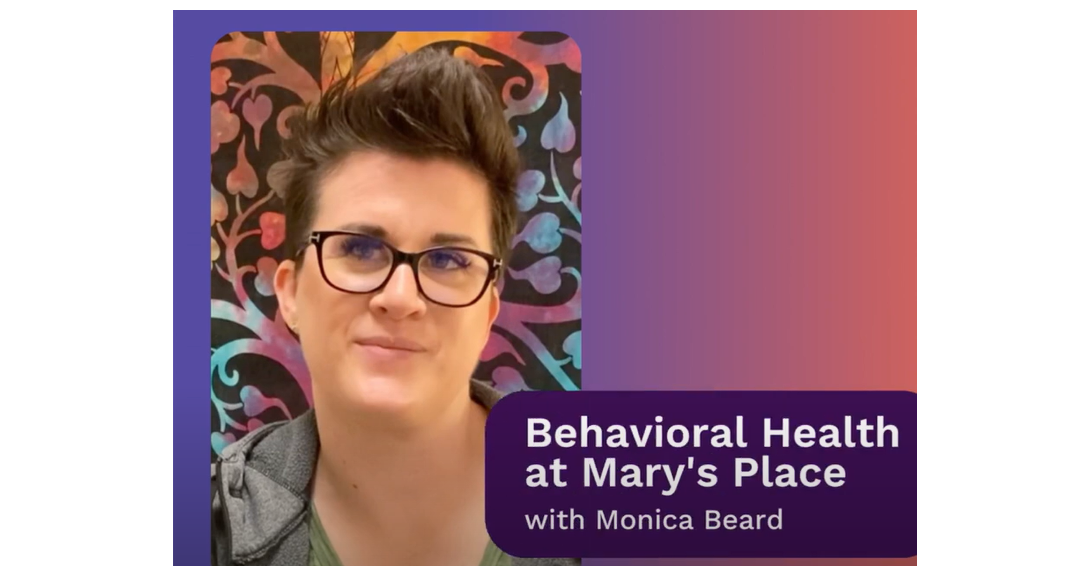Providing behavioral health support - meet Monica Beard!
Behavioral health care is essential for many families and individuals experiencing homelessness to succeed in finding housing and maintaining stability in their new homes. But for those experiencing homelessness, the barriers to behavioral health services can feel insurmountable. From complicated and overwhelmed care systems, to those things many of us take for granted, like access to a phone or reliable transportation, accessing and continuing behavioral health care can be challenging.
Mary's Place Behavioral Health Specialists help evaluate our guests’ unique behavioral health needs, navigate systems, and create supports for long-term success.
Monica Beard is a Behavioral Health Coordinator at Mary’s Place, primarily working out of our Women’s Day Center. Monica has a social work background and is passionate about helping women experiencing homelessness with their behavioral health needs. The opportunity to break down barriers and challenge the stigmas associated with mental health and homelessness is why Monica loves her role at Mary’s Place!
“A stigma that I see with mental health, especially when it comes to folks experiencing homelessness, is that people believe it’s an issue that a guest has caused themselves, instead of looking at our homelessness response and mental health systems as a whole system that impacts our guests and their access to care,” says Monica. Behavioral Health Specialists like Monica bridge communication gaps between service providers and tap into community partnerships to help our guests find the right care. They can help navigate barriers like transportation, correspondence with providers, insurance, and IDs to ensure that our guests find the care they need and can access it reliably.
When talking about her work to break down stigmas , Monica says, “this work is about treating people as people. There can be a lot of discomfort around behaviors people might have when they’re going through mental health challenges…living with homelessness and mental illness simultaneously is a double whammy that can be really challenging. People experiencing this deserve dignity and patience.”
In her time at Mary’s Place, Monica has learned that for some people, behavioral health care starts with taking care of basic needs like food, clothing, and pressing medical issues. “To be successful in caring for someone, we have to recognize where an individual is at and take steps from there. The priority is always meeting their basic needs; then we can start to work towards mental health care coordination and the ultimate goal of stable living and housing.”
Meeting folks where they’re at and guiding their behavioral health journey with empathy and patience is a cornerstone of Monica’s approach to working with guests. “People come to us with a lot of life that they’ve lived, a lot of experiences, a lot of trauma, and sometimes coping strategies. When working with people, we incorporate all that life and look at who they are as people to try and support them with their needs.”
Monica will always remember Alice (not her real name), a 54-year-old woman who’d been chronically homeless for about ten years. Alice had been in and out of housing and hotels, dealing with intimate partner violence, racism and discrimination from landlords and neighbors, trauma, and chronic health conditions, including diabetes. Monica provided trauma and crisis support and connected Alice to a coordinated outreach case management and medical team to make her care more accessible. Once her medical needs were met and stable care was established, Monica helped Alice get into Downtown Emergency Service Center’s supportive housing program. In a large collaboration with her DESC case management team, she got her keys to an apartment with in-house access to supportive services last year.
Alice’s story was memorable for Monica because it was a true testament to the power of collaboration with service providers and Alice’s advocacy for her own needs. Monica shares that “social work is a long game”. Working at the intersection of homelessness and behavioral health takes creativity and tenacity, and this was a big win! After she moved in, Alice told Monica that she was so excited to have her own place and felt safe for the first time in a long time.
“Much of my work is advocating on people’s behalf and helping them navigate in systems that can be complicated,” shares Monica, “now that she’s in supportive housing, she can receive the wrap-around mental and physical health care she needs.”
“My approach working with our guests is really about honoring the person’s self-determination and their strengths,” says Monica, “The folks who come to us have a lot of strengths that they might not see when they’re focusing on surviving. I work with them to provide a lot of connections, resources, and education so they can be successful in the future and see their own power.”


